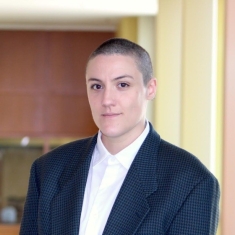Rutgers Law Students Launch Online Name Change Resource
The Rutgers University Name Change Pro Bono Project was launched in 2022 to support individuals navigating the often-complex legal process of changing their name in New Jersey. The law students who run the project work with people whose gender identity differs from the one they were assigned at birth, providing legal support tailored to their unique needs. What began as an initiative by one Rutgers Law student a few years ago made significant progress recently. During the Spring 2025 semester, three students from the Legislative and Policy Advocacy Clinic in Camden created a step-by-step guide to break down the 10-step name change process. Taking it a step further, the students also developed a user-friendly website to make this valuable resource easily accessible to the public. The website officially launched just a few weeks ago.
The Origin

As a first-year law student, the Name Change Project instruction guide was handed to Kayalyn Kibbe ’25 (pronouns: they/them) in what they describe as “an unwieldly binder.” They knew there had to be a better way to handle the project. Kibbe decided lugging around a giant binder wasn’t efficient or accessible. They were determined to disseminate the information to the people who need it the most instead of it being held hostage in just a few hands.
In February of their first year, Kibbe attended their first Name Change Assistance event, where Rutgers Law students help individuals navigate the overwhelming name change process. Only four people attended. Rather than feeling discouraged, Kibbe saw the small turnout as a starting point for growth.
“I think a lot of people would have been discouraged because we did a lot of advertising, worked hard to get the word out,” Kibbe said. “I was thrilled that four people showed up because that’s four people who can go back and tell their friends, that’s four people who can vouch for us, that’s four people who gave us feedback on how we were doing.”

Kibbe focused on outreach in the months that followed. They worked closely with OUTlaws, Rutgers Law’s LGBTQ+ student group, connected with professors involved in LGBTQ+ legal advocacy, and collaborated with alumni Leigh Henjes ’20 and Emma Martin ’23 to identify ways to make the name change forms more accessible. Kibbe, Henjes, and Martin realized that it wasn’t sustainable for the three of them to be the only pro bono name change group in the state of New Jersey.
They partnered with nonprofit organizations and large law firms to expand their impact, including Volunteer Lawyers for Justice, McCarter & English LLP, Lowenstein Sandler LLP, and Garden State Equality. They shared resources, hosted trainings, and organized collaborative events. Kibbe said, “We want other people doing this work, too. We don’t want there to be a sense of entitlement or ego about who does this work.”
The Next Big Step
In the Fall 2024 semester, Professor Ruth Anne Robbins, the Director of Legislative and Policy Advocacy Clinic in Camden approached Kibbe and Henjes about the potential for the Project to be a clinic client during the clinic’s first official semester as a clinic. Work started in the Spring 2025 semester when Kibbe tasked three students from the clinic with improving how the project communicated in writing with the people it serves. Together, they set out to simplify the documents explaining the name change process and developed an easy-to-follow visual guide over the course of the semester. What began as a dense set of documents and a lengthy manual was transformed into a clear, accessible, and easily printable infographic. The document also includes QR codes that take the viewer to short online screencast tutorials offering more helpful guidance about certain steps in the courts’ process.
However, the clinic students saw the potential for broader impact. They took their project and found it a home on the Internet. According to Professor Robbins, “The students realized that as part of the infographic’s architecture, the clients [Kibbe and Henjes] would need to create some short screencast tutorials and that we needed a place to house those videos. That’s when they decided to build a webpage and to include links to other documents that name-change-seekers would encounter. The webpage wasn’t part of the initial ask, but the natural outgrowth.”
The result is a comprehensive digital resource, which can be found at https://sites.rutgers.edu/name-change-project/online-document/.
The Legacy
Kibbe hopes that refining and simplifying the name change process will empower not only attorneys, but also other professionals—like social workers, nurses, and trusted community advocates—to help people navigate the process. They envision a future where individuals already embedded in LGBTQ+ communities can step in with knowledge and support.
“I think if our legacy could be a single word, it would be community,” Kibbe said.
Today, the Name Change Assistance events regularly draw more than 20 law student participants. Kibbe and their collaborators are committed to ensuring these events remain welcoming and joyful, complete with snacks, music, and a sense of celebration.
Looking for help to change your name in New Jersey? You can find all the resources online here and the name change assistance events here.